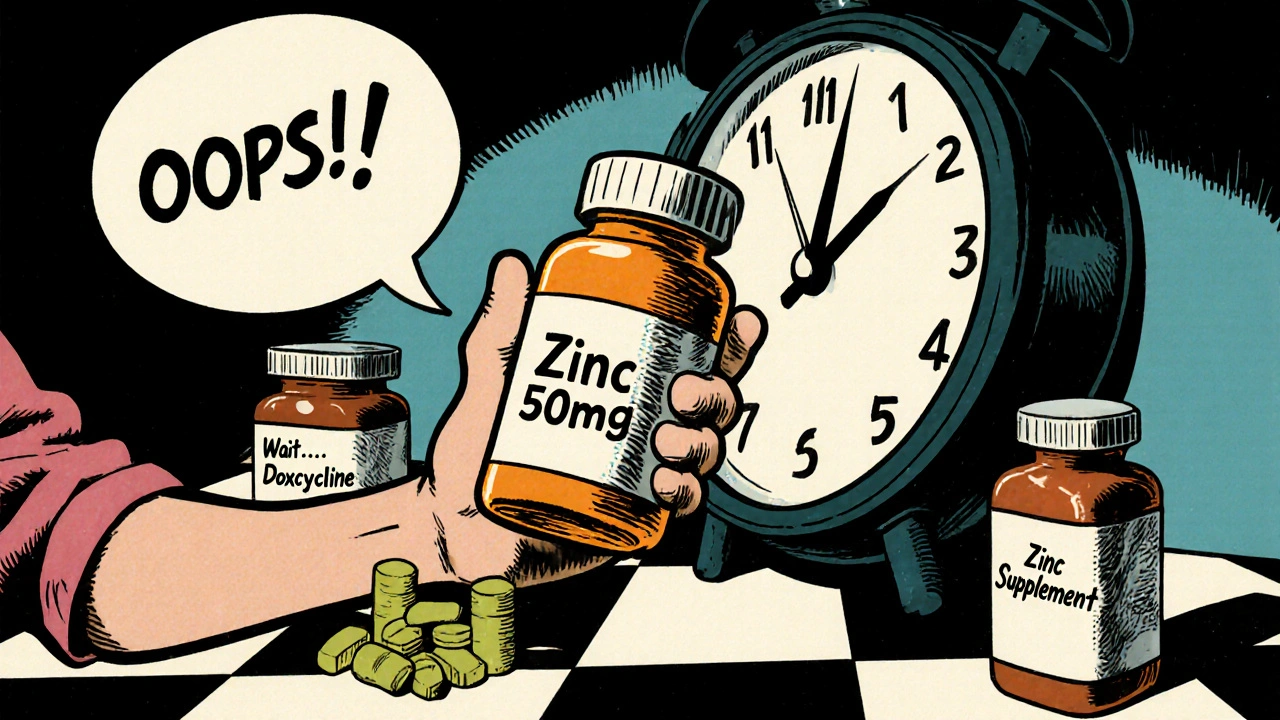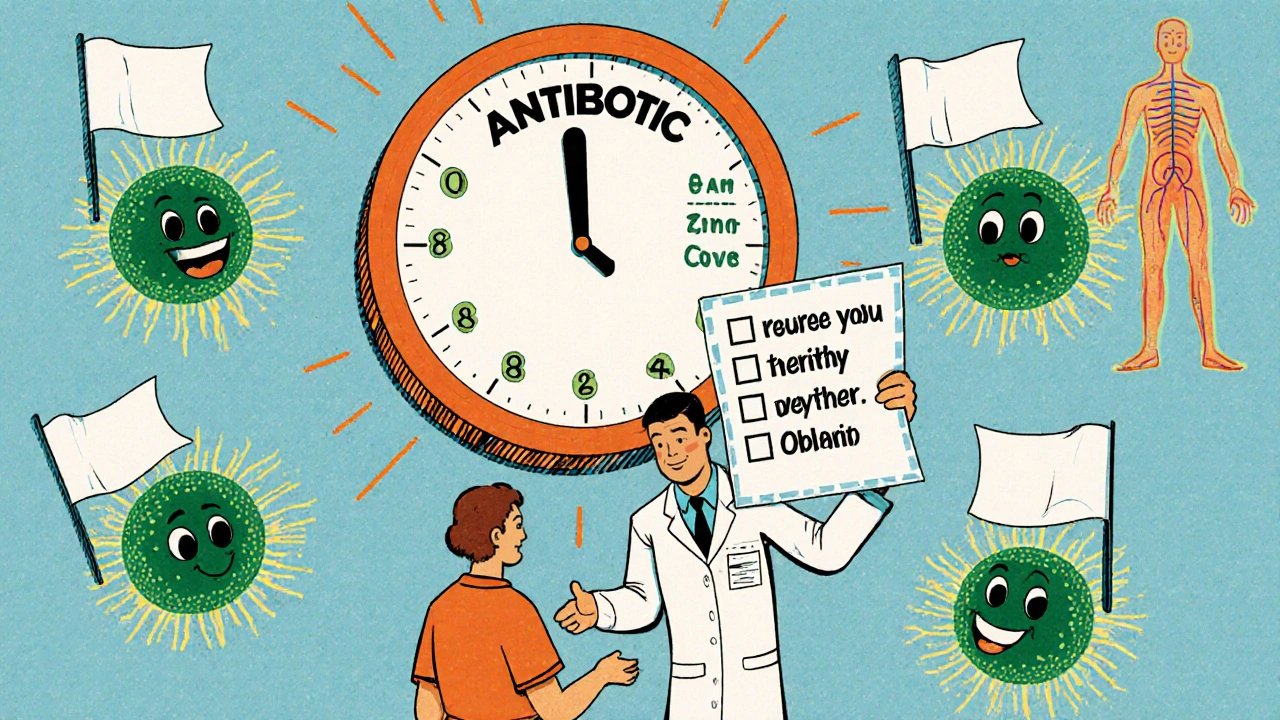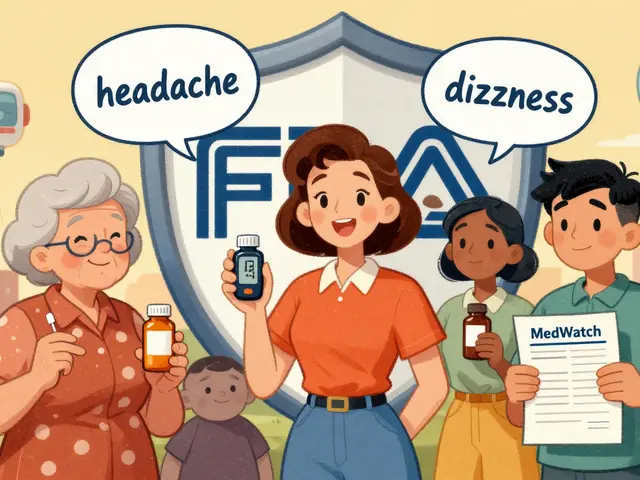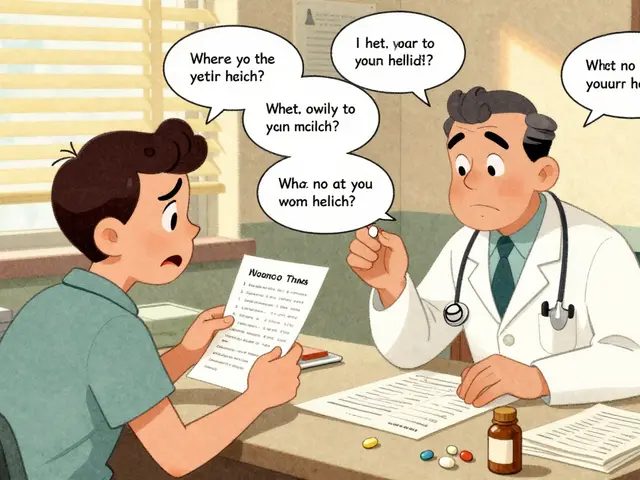Zinc & Antibiotic Timing Calculator
How to Use This Tool
Select your antibiotic type and zinc dose to calculate the minimum time gap needed. This tool helps prevent reduced antibiotic absorption due to zinc interactions.
Recommended Timing
Select your antibiotic and zinc dose to see the safe timing gap.
When you're sick and your doctor prescribes antibiotics, you want them to work. But if you're also taking zinc supplements - maybe for immunity, skin health, or just because you heard they help - you could be accidentally blocking the antibiotic from doing its job. This isn't a myth or a vague warning. It's a well-documented, clinically proven interaction that can lead to treatment failure, longer illness, or even antibiotic resistance.
Why Zinc Interferes with Antibiotics
Zinc doesn't just sit there quietly in your gut. When you take it at the same time as certain antibiotics, it actively competes with them for absorption. The main culprit is a transporter in your small intestine called PEPT1. This protein is like a gatekeeper that pulls certain antibiotics - especially tetracyclines, quinolones, and some β-lactams - into your bloodstream. Zinc ions bind to the same spot, blocking the antibiotic from getting through.On top of that, zinc can chemically bind to these antibiotics in a process called chelation. Think of it like two magnets sticking together. When zinc and antibiotics like doxycycline or ciprofloxacin chelate, they form a compound your body can't absorb. The result? Less antibiotic in your blood, less fight against the infection.
Studies show this isn't theoretical. In one 2012 study with 12 healthy men, taking zinc sulfate at the same time as cephalexin dropped the antibiotic's blood levels by nearly half. Another study found that taking zinc with doxycycline reduced absorption by up to 50%. That’s not a small drop - that’s the difference between healing and relapsing.
Which Antibiotics Are Affected?
Not all antibiotics are equally affected. Some are highly vulnerable. Others barely notice zinc is there.- High risk: Tetracyclines (doxycycline, minocycline, tetracycline) - these bind tightly to zinc. Even a 15 mg zinc supplement can cut absorption in half.
- High risk: Quinolones (ciprofloxacin, levofloxacin, moxifloxacin) - zinc reduces absorption by 20-40%. A urinary tract infection treated with ciprofloxacin might not clear if you're also taking zinc.
- Moderate risk: β-lactams (cephalexin, amoxicillin) - the 2012 NIH study confirmed measurable drops in blood levels when taken with zinc.
- Low or no risk: Macrolides (azithromycin, clarithromycin), aminoglycosides, and penicillins (like amoxicillin) - these don’t rely on PEPT1 or chelation the same way. Zinc won’t interfere significantly.
If you're on doxycycline for acne or Lyme disease, or ciprofloxacin for a UTI, you need to be extra careful. The interaction isn't just possible - it's common enough that pharmacists see it regularly.
How Long Should You Wait?
The good news? This is fixable. You don’t have to stop taking zinc. You just need to space things out.The standard recommendation from the NIH, WebMD, and the Linus Pauling Institute is simple: take antibiotics at least 2 hours before or 4-6 hours after zinc.
Why the difference in timing?
- 2 hours: Works for most antibiotics like cephalexin or azithromycin, if you're taking a standard zinc dose (15-30 mg).
- 4-6 hours: Strongly recommended for tetracyclines and quinolones. These bind so tightly to zinc that even a 2-hour gap might not be enough - especially if you're taking 50 mg or more of zinc.
Here’s how to plan it:
- If you take your antibiotic in the morning (say, 8 a.m.), wait until at least 10 a.m. to take zinc - or better yet, wait until lunch or early afternoon.
- If you take your antibiotic at night (say, 8 p.m.), take zinc at breakfast or lunch - not right before bed.
- If you're on a once-daily antibiotic like doxycycline, take it first thing in the morning on an empty stomach, then wait 4-6 hours before your zinc supplement.
Don't think "I took my antibiotic at 8 a.m. and my zinc at 6 p.m. - that’s 10 hours apart, so it’s fine." That’s not how it works. The rule is about the window around the antibiotic dose. If you take zinc within 2 hours before or after, you’re risking interference.

What About Multivitamins?
This is where most people get tripped up.Many multivitamins contain zinc - often 10-30 mg per tablet. If you're taking a daily multivitamin with your antibiotic, you’re likely interfering without realizing it.
Check the label. Look for "elemental zinc." If it says "zinc oxide 200 mg," that doesn’t mean 200 mg of zinc. Elemental zinc is usually only 20-25% of that amount. So 200 mg zinc oxide = about 45 mg elemental zinc. That’s a high dose - and definitely risky with doxycycline or ciprofloxacin.
Two options:
- Switch to a multivitamin without zinc while on antibiotics.
- Take your multivitamin at least 4-6 hours away from your antibiotic dose.
Same goes for fortified foods. Some cereals, protein bars, or meal replacements have added zinc. If you’re eating one of those right before or after your antibiotic, you’re adding to the problem.
What Happens If You Don’t Separate Them?
This isn’t just about "it might not work as well." This is about real, measurable treatment failure.On health forums, users report:
- "My UTI came back after I finished ciprofloxacin - I didn’t know zinc was the issue."
- "I took doxycycline for Lyme and felt worse for weeks. Once I stopped taking my zinc supplement at the same time, I felt better in 24 hours."
- "I had to restart my antibiotics because the first course didn’t clear the infection."
One documented case from a Drugs.com forum involved a 45-year-old woman whose recurring UTI was directly linked to her daily 50 mg zinc supplement taken within an hour of ciprofloxacin. Her infection cleared only after she adjusted her timing.
Worse, if antibiotics don’t reach therapeutic levels, bacteria can survive and adapt. That’s how antibiotic resistance starts - not just from overuse, but from under-dosing due to unnoticed interactions.
What About Zinc Formulations?
Not all zinc is the same. The chemical form matters.Studies show zinc sulfate - the cheapest and most common form - causes the strongest interference. Zinc citrate and zinc gluconate appear to be less disruptive, possibly because they release zinc more slowly or bind less aggressively.
If you're on long-term antibiotics and need zinc, switching from zinc sulfate to zinc citrate might help reduce the interaction. But don’t rely on this alone. Timing is still essential.
Also, avoid extended-release zinc supplements while on antibiotics. These release zinc slowly over hours, increasing the chance of overlap. Stick with immediate-release forms and be strict about timing.

How to Make This Easy
Managing two supplements with strict timing sounds overwhelming. But it doesn’t have to be.- Use phone reminders: Set two alarms - one for your antibiotic, one for your zinc. Apps like Medisafe or MyTherapy can track multiple medications with alerts.
- Use a pill organizer: Put your antibiotic in one compartment, your zinc in another, labeled with the time.
- Link it to meals: Take your antibiotic on an empty stomach (usually 1 hour before or 2 hours after food). Take zinc with lunch or dinner - that naturally creates separation.
- Ask your pharmacist: When you pick up your antibiotic, ask: "Does this interact with zinc? How long should I wait?" Most pharmacists will give you a printed handout.
Patients who use reminders have an 83% success rate with timing. Those who don’t? Only 47%. This isn’t about being perfect - it’s about being consistent.
When to Talk to Your Doctor
If you’re taking antibiotics and zinc regularly, here’s when to speak up:- Your infection isn’t improving after 48-72 hours.
- You’ve had the same infection recur after treatment.
- You’re taking zinc for a chronic condition (like acne or immune support) and need antibiotics frequently.
- You’re unsure what’s in your multivitamin.
Your doctor might switch you to an antibiotic that doesn’t interact with zinc - like azithromycin - if it’s appropriate for your condition. Or they might recommend a different supplement form or dose.
Don’t assume your doctor knows you’re taking zinc. Most people don’t mention supplements unless asked. Be upfront.
The Bottom Line
Zinc supplements and antibiotics can coexist - but only if you respect the timing. This isn’t a "maybe" or a "sometimes." It’s a hard rule with real consequences.Take your antibiotic first. Wait 2-6 hours. Then take your zinc. Check your multivitamin label. Use reminders. Talk to your pharmacist.
That’s it. No magic. No complicated science. Just smart timing.
If you’re on antibiotics right now and taking zinc - stop taking them together today. Wait. Then resume zinc safely. Your body will thank you.
Can I take zinc and antibiotics at the same time if I have a high dose of antibiotics?
No. Increasing the antibiotic dose won’t fix the absorption problem. Zinc blocks the antibiotic from entering your bloodstream, so even a higher dose won’t help if the body can’t absorb it. The only solution is separating the doses by at least 2-6 hours, depending on the antibiotic.
What if I accidentally take zinc and an antibiotic together?
If it was a one-time mistake, don’t panic. Skip your next zinc dose and resume timing correctly with your next antibiotic dose. Don’t double up on either. If you’re on a short course (like 5-7 days), just wait it out. If you’re on long-term antibiotics or have a serious infection, contact your doctor - they may want to check your progress or adjust your treatment.
Is zinc safe to take with all antibiotics?
No. Zinc strongly interferes with tetracyclines (doxycycline), quinolones (ciprofloxacin), and some β-lactams (cephalexin). It has little to no effect on macrolides (azithromycin), aminoglycosides, or penicillins like amoxicillin. Always check the specific antibiotic you’re taking - and ask your pharmacist.
Can I take zinc with food and antibiotics on an empty stomach?
Yes - and it’s actually a good strategy. Many antibiotics (like doxycycline) work best on an empty stomach. Take your antibiotic 1 hour before breakfast, then take your zinc with lunch or dinner. This naturally creates the 4-6 hour gap you need, without extra planning.
How long should I wait after finishing antibiotics before resuming zinc?
You can resume zinc as soon as your antibiotic course is complete. There’s no need to wait days or weeks. Once the antibiotic is out of your system, zinc won’t interfere. Just make sure you’ve taken your last antibiotic dose - and then wait at least 2 hours before your next zinc dose to be safe.






Comments
Good breakdown. I always thought zinc was just a harmless boost, but this makes it crystal clear why timing matters. I’ve been taking doxycycline for acne and a zinc tablet every morning - no wonder my skin kept flaring up.
Now I take my antibiotic at 7 a.m. on an empty stomach and my zinc with lunch. No more guesswork.
OMG I JUST REALIZED I’VE BEEN DOING THIS WRONG FOR YEARS 😭
My multivitamin has 25mg zinc and I take it with my cipro at night - no wonder my UTIs keep coming back!!
Thank you thank you thank you!! I’m deleting my vitamin from my night routine ASAP!!
Wait… so you’re telling me… zinc… isn’t magic? 🤨
And that this whole thing… is just… chemistry?
Who knew. I thought it was Big Pharma hiding the truth. Also, why are we even taking zinc? Are we all just trying to be immune gods now?
USA people always overcomplicate everything. In India we take antibiotics with milk and turmeric. Zinc? Who cares?
Also, why do you need supplements? Eat dal and roti. Problem solved.
Western medicine is weak.
Y’all, this is gold. 🙌
I’m a nurse and I’ve seen so many patients come back with the same infection because they didn’t know about this. I always tell folks: "Antibiotic first, zinc later - like coffee before breakfast, not after."
And yes, check your multivitamin label - "zinc oxide 200mg" sounds like a lot, but it’s only ~45mg elemental. Still too much if you’re on doxy.
Use reminders. Your body will thank you later. 💪
Typo in the post: 'chelation' spelled right but nobody knows what it means. Just say zinc sticks to the antibiotic and blocks it. Done.
Also, why are we even talking about this? Just don’t take zinc. Easy.
This is a well-researched and meticulously structured piece - a rare gem in the sea of misinformation. That said, the casual tone undermines the gravity of the clinical implications. One must treat pharmaceutical interactions with the solemnity they deserve. No emoticons. No slang. No "you’re welcome."
Another post about supplements. Why do people waste time on this? Just take the pill. If it doesn't work, take another. Simple.
Also, who even takes zinc? That’s for old people and yoga moms.
Oh my god. I took zinc with my cipro last week. I’m lucky I didn’t die. I’m writing a Yelp review for my pharmacy. They didn’t warn me. I’m suing for emotional distress. My cat noticed I was sicker. He’s now my therapist.
Also, zinc is a lie. I’m switching to garlic.
Y’all. I’ve been taking zinc with my doxy for 2 years. 😬
My skin cleared up… but I got pneumonia twice. I thought it was stress. Turns out, it was the zinc. I stopped. 48 hours later, I felt like a new person.
Also, I now use a pill organizer with 🟢 for antibiotic and 🔴 for zinc. It’s cute and functional. #ZincAware
While your advice is technically accurate, it’s deeply irresponsible to assume everyone has the luxury of timing their supplements with surgical precision. Many people work double shifts, have erratic schedules, or take medications for chronic conditions. This post reads like it was written by someone who has never missed a meal or had a 3 a.m. panic attack because their alarm didn’t go off.
Also, zinc sulfate is cheaper - why punish people for being poor?
Interesting. So if I take zinc with food, and my antibiotic on an empty stomach, does that automatically create the gap? Or am I just deluding myself?
Also, why does no one ever mention that some people take zinc for hair loss? I’ve got thinning strands and a UTI. Help.
So basically if you're on antibiotics don't take zinc. Done.
Why did we need 2000 words for that? I mean, it's cool info but come on. Just say no to zinc with cipro. That's it. No need for charts or NIH studies. I'm out.